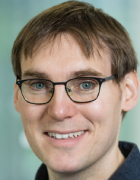
Prof. Dr. Christian Mendl
Academic Career and Research Areas
Christian Mendl conducts research in the fields of computational physics for quantum systems, quantum computing and nonequilibrium statistical physics. His work focuses, in particular, on algorithm development and the simulation of (strongly correlated) quantum systems on high-performance computers, using tensor network methods, quantum Monte Carlo and exploring methods inspired by artificial neural networks. In the field of statistical physics, Prof. Mendl investigates systems within the Kardar-Parisi-Zhang universality class.
Prof. Mendl studied physics and mathematics at TUM. After his PhD at the LMU Munich (2012), he worked as a postdoc together with Herbert Spohn on topics of statistical physics. A Feodor Lynen fellowship from the Humboldt Foundation led him to Stanford University in 2015, where he investigated models for high-temperature superconductors using quantum Monte Carlo methods. In 2017, he was appointed Junior Professor at TU Dresden and, in 2019, as a Rudolf Mößbauer Assistant Professor at TUM.
Awards
- Feodor Lynen Research Fellowship of the Alexander von Humboldt-Foundation (2015)
- Boehringer Ingelheim Fonds PhD Fellowship (2009)
- German Academic Scholarship Foundation (2005)
Key Publications (all publications)
Milbradt R, Scheller L, Aßmus C, Mendl CB: "Ternary unitary quantum lattice models and circuits in 2 + 1 dimensions". Phys. Rev. Lett. 130, 090601 (2023).
AbstractHuang EW, Mendl CB, Liu S, Johnston S, Jiang H-C, Moritz B, Devereaux TP: "Numerical evidence of fluctuating stripes in the normal state of high-Tc cuprate superconductors". Science 358, 1161-1164.
AbstractBohrdt A, Mendl CB, Endres M, Knap M: "Scrambling and thermalization in a diffusive quantum many-body system". New J. Phys. 19, 063001 (2017).
AbstractMendl CB, Spohn H: "Dynamic correlators of Fermi-Pasta-Ulam chains and nonlinear fluctuating hydrodynamics". Phys. Rev. Lett. 111, 230601 (2013).
AbstractMendl CB, Wolf MM: "Unital quantum channels - Convex structure and revivals of Birkhoff's theorem". Commun. Math. Phys. 289, 1057-1086 (2009).
AbstractIf you wish your profile to be changed or updated please contact Franz Langer.